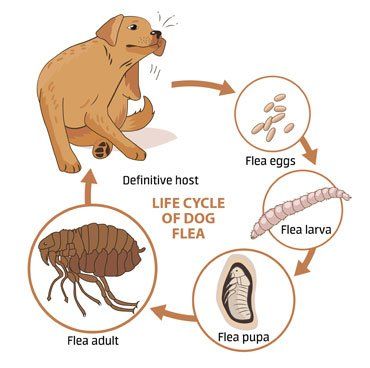Flea Pest Control
Griffin Pest Management flea control services for your home or business that are backed by our service guarantee. Griffin’s licensed and trained flea exterminators utilize an integrated pest management approach to find flea harborage areas and source reduction methods and pesticide treatments to exterminate your flea problem. Call today for a free estimate.
What Are Fleas?
Flea Exterminators
Immediate Flea Control
Don’t Let Fleas Get Out of Control
A typical flea infestation is about 50% eggs, 35% larvae, 10% pupae (cocoons) and only 5% adults. Their complete life cycle can be as short as two weeks. In that time, female fleas can lay five hundred or more eggs, allowing for exponential growth rates within your home. Fleas will find their way into your home on one of your pets before infesting areas around the pets bedding before spreading to the rest of your home. If your pet shows signs of irritation or distress, it may be a sign that they are dealing with fleas and that it may be time to check around where they sleep to see if there are signs of flea eggs and activity.
Flea Treatment, Preparation, & Prevention
Interrupting Life Cycle & Stopping Reproduction
Control measures should focus on where fleas are found. Residual flea pesticides are used to help break the flea life cycle. Adulticides kill mature fleas on contact while growth regulators stop developing fleas in the larval stages. These pesticides should be applied to inside and outside harborage areas like carpets, dog houses, upholstery, etc.
Pet Care
It is important that the pet is treated at the same time as the house to prevent the fleas from being reintroduced. Pet owners should use safe flea medications and bathe and groom their pets regularly to ensure that pets are kept free of fleas. In addition to pet care, ensuring that pet beds are washed in water hot enough to kill off any fleas and their eggs.
Regular Inspections
Since complete flea extermination is difficult to achieve, it is important to have regular inspections after the initial treatment to ensure they have been removed completely. Griffin’s licensed and trained technicians will come back during regular services and check flea harborages to see if there are any signs of remaining fleas or their eggs.
Prevention
Clean and vacuum frequently to help remove flea populations and prevent the laying of eggs. Keep your lawn groomed to avoid rodent habitation. Protect pets by keeping them on a leash when outside, bathing and grooming pets regularly, visiting a veterinarian annually. If infested, it is important to hire a pest professional to rid your home of rodents and fleas.
Flea Treatment Preparation
Quick Facts About Fleas
Habits
Fleas transport themselves on rodents and other mammals. They infest both household pests and wild animals. Fleas use their powerful legs to jump as high as 8 inches vertically and 16 inches horizontally. Fleas wait to receive a signal that a host is near; vibrations, sound, heat and carbon dioxide are all stimuli indicating the presence of a host.
Habitat
Fleas usually remain on their warm-blooded hosts at all times. They can also be found on shoes, pant legs, or blankets, which can transfer the fleas to new environments. They are often found infesting opossums, raccoons, and skunks in urban settings.
Threats
Fleas are the most common transmitter of the rare Bubonic Plague. They also transmit the bacterial disease murine typhus to humans through infected rats. Their saliva can cause serious Flea Alergy Dermatitus in pets, and their debris has been reported to cause similar allergic reactions in humans. Fleas can also transfer tapeworms and cause anemia in pets. Flea bites commonly cause painful, itchy red bumps.
Prevention
Argentine ants require a water source. Sealing all cracks and openings around kitchens and bathrooms will cut down on infestations. Keep tree branches and other plants cut back from the house. Sometimes ants use these branches to get into your home. Make sure that there are no cracks or little openings around the bottom of your house. Sometimes pests use these to get into your home. Make sure that firewood and building materials are not stored next to your home. Ants like to build nests in stacks of wood.


